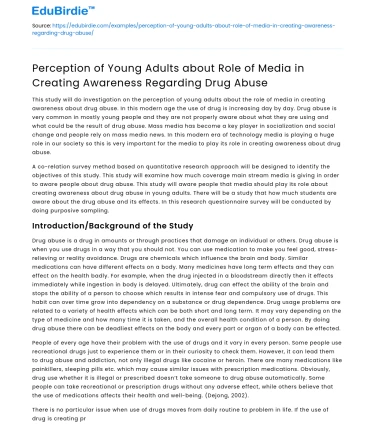Introduction
The role of media in shaping societal perceptions and behaviors is profound, especially concerning critical issues such as drug abuse. Young adults, who are among the largest consumers of media content, are significantly influenced by how media frames drug-related narratives. As digital natives, their perception is shaped not only by traditional media but also by social media platforms that offer a plethora of information and misinformation alike. This essay explores young adults' perceptions of media's role in drug abuse awareness, analyzing how media representations impact their understanding, attitudes, and behaviors towards drug use. It delves into the nuances of media influence, including the potential for both positive awareness and detrimental misinformation. The discussion is grounded in real-life examples, scholarly research, and addresses counterarguments to present a comprehensive view of the young adult demographic's interaction with media messages on drug abuse.
Media's Influence on Drug Awareness
Media, in its various forms, plays a pivotal role in disseminating information about drug abuse. For young adults, the exposure to media narratives about drug use and its consequences can significantly shape their understanding and awareness. Traditional media outlets such as television and newspapers have long been channels through which drug-related information is communicated—often focusing on the detrimental effects and social consequences of drug abuse. A study by the National Institute on Drug Abuse (2020) highlights that media campaigns focusing on the risks associated with drug use can effectively reduce initiation among young people. The portrayal of drug abuse in popular television series and films also serves as a cautionary tale, often dramatizing the consequences to elicit fear and deter usage.
Save your time!
We can take care of your essay
- Proper editing and formatting
- Free revision, title page, and bibliography
- Flexible prices and money-back guarantee
However, the rise of digital media has transformed the landscape, introducing new challenges and opportunities. Social media platforms, where content is user-generated and less regulated, have the dual capacity to spread awareness and misinformation. According to Moreno et al. (2019), platforms like Instagram and TikTok can perpetuate misconceptions about drug use, often glamorizing or trivializing the issue. This dichotomy presents a challenge: while media can be a powerful tool for education, it can also distort reality, leading to misconceptions among young adults. The transition from traditional to digital media necessitates a critical evaluation of sources and content, urging young adults to discern credible information from sensationalized or misleading narratives.
Counterarguments and Diverse Perspectives
While the media's role in drug abuse awareness is largely viewed as positive, there are notable counterarguments regarding its effectiveness and impact. Critics argue that media campaigns often fail to resonate with young audiences, who may perceive them as exaggerated or out of touch with reality. This sentiment is echoed in a study by Slater et al. (2018), which found that anti-drug campaigns sometimes inadvertently glamorize drug use by focusing excessively on the substances rather than the context of abuse. Furthermore, the sensationalism commonly employed by media outlets to capture attention can lead to desensitization, reducing the impact of critical messages.
Another perspective suggests that media's focus on drug abuse can inadvertently stigmatize users, leading to social ostracism rather than support. The framing of drug users as criminals or morally deficient individuals can perpetuate stereotypes, hindering efforts to approach drug abuse as a public health issue. Young adults, who are often in the process of forming their opinions and beliefs, may internalize these stigmatizing views, impacting their attitudes towards peers who struggle with substance abuse. Therefore, it is essential for media representations to adopt a balanced approach that emphasizes empathy, support, and factual information over sensationalism and stigma.
Constructive Media Engagement Strategies
To harness the potential of media positively, it is crucial to develop strategies that promote constructive engagement with drug abuse narratives. Educational initiatives that empower young adults to critically assess media content can play a significant role in enhancing media literacy. Programs that focus on decoding media messages, understanding biases, and recognizing credible sources equip young adults with the tools needed to navigate the digital information landscape effectively. According to a report by the Media Education Foundation (2021), media literacy education can significantly reduce the influence of misleading drug-related content among youth.
Additionally, collaboration between media professionals, educators, and health organizations can lead to the creation of more effective awareness campaigns. By involving young adults in the design and dissemination of these campaigns, media messages can be tailored to resonate more deeply with this demographic. The use of relatable narratives, peer testimonials, and interactive content can enhance engagement and retention of information. Ultimately, fostering an environment where young adults are active participants in media creation rather than passive consumers can lead to more informed perceptions and responsible behaviors regarding drug use.
Conclusion
In conclusion, young adults' perception of media's role in drug abuse awareness is complex, influenced by the dual nature of media as both an educational tool and a source of misinformation. While traditional media has long served as a vehicle for awareness, the advent of digital platforms has introduced new dynamics that require careful navigation. By acknowledging and addressing the counterarguments and challenges associated with media representations, stakeholders can work towards more effective communication strategies. Empowering young adults through media literacy and constructive engagement initiatives is essential for fostering informed perceptions and responsible attitudes towards drug abuse. As media continues to evolve, so too must our approaches to leveraging its power for positive societal impact.






 Stuck on your essay?
Stuck on your essay?

